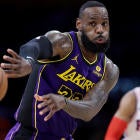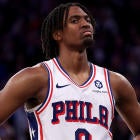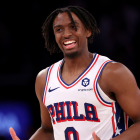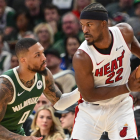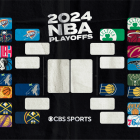
The budding relationship between fifth-year forward Rui Hachimura and four-time MVP LeBron James has been one of the stories of the offseason for the resurgent Los Angeles Lakers. Stories of the two working out together have become commonplace. "I call him my Daniel-san and I'm Mr. Miyagi," James joked at Lakers' media day Monday. It was an appropriate comparison not just between James and Hachimura, but the legend and his entire team.
Now that Udonis Haslem has called it a career and Andre Iguodala is seemingly headed in that direction, James is officially the NBA's oldest active player. He proved that he is still a superstar on the court last season, but aside from Anthony Davis and Taurean Prince, all of his Laker teammates are at least a decade his junior. In a perfect world, the days of James pushing for 30-point triple-doubles on a nightly basis are now over. He has a group of young teammates eager to learn from his example and lift him up when he needs it.
"I think with this team we have the most depth," new Lakers big man Christian Wood said Monday. "No team in the league has more depth than we have." This was the goal of the Lakers' offseason. Though they didn't make any particularly splashy additions, six of the seven Lakers to play at least 200 postseason minutes are back this season. Joining them are Gabe Vincent, a starter on Miami's finalist from a season ago, and Wood, one of the NBA's most dynamic scoring big men. Rounding out the new-look bench are former first-round picks Taurean Prince (29), Cam Reddish (24) and Jaxson Hayes (23). That youth-oriented approach was no accident, as Lakers coach Darvin Ham explained Friday.
"Now that we have, top-to-bottom, what we feel is a highly balanced, skilled, athletic, younger team of guys that have logged a ton of NBA minutes, we can surround both he and AD with these players who are coming in eager to contribute, eager to show that they can impact winning," Ham said. "That's gonna allow us to be able to be more efficient with his game-to-game minutes."
Managing James' minutes was difficult last season. The Lakers lacked depth on a roster depleted by the Russell Westbrook trade, and when Davis was hurt, James needed to carry a remarkable burden just to keep the Lakers afloat. He averaged 24.1 shots and 34.6 points per game between Dec. 18 and Jan. 24, Davis' longest extended absence of the season. Roughly one month later, he suffered the foot injury that hampered him for the rest of the season. It's an outcome Davis is hoping to avoid this time around.
"It's my goal every year to play 82," Davis said. Though likely unobtainable, keeping Davis on the floor will be essential to the Lakers' championship hopes this season. In fact, James might even argue that his co-star's health is more important than his own. "He is the face [of the franchise]," James said at media day. For stretches last season, he was among the NBA's best players. Between Nov. 13 and his own injury on Dec. 13, Davis averaged 32.4 points per game while doubling as the league's best defensive player.
But for the Lakers to realize their considerable potential, he'll have to sustain that dominance for longer stretches. The supporting players, who were so instrumental in lifting the Lakers from out of the top-10 in the West and into the Western Conference finals, will have to continue to benefit from James' presence as Hachimura has. The Lakers went from cellar-dweller to contender last season when they morphed from an older, star-driven roster to a younger, balanced one, and whether that means Davis stepping into James' role as the focal point of the team or the role players improving with another year in the system, the Lakers made it clear at media day that they plan to continue that transformation.















